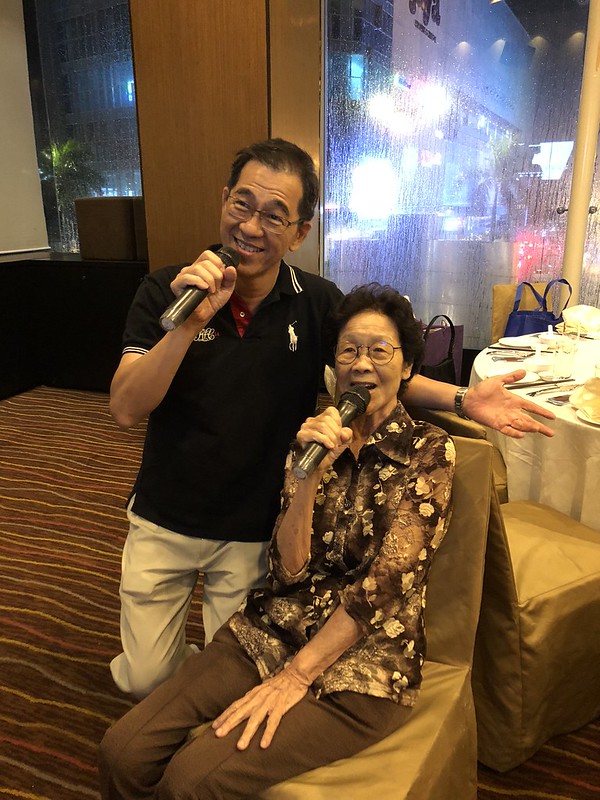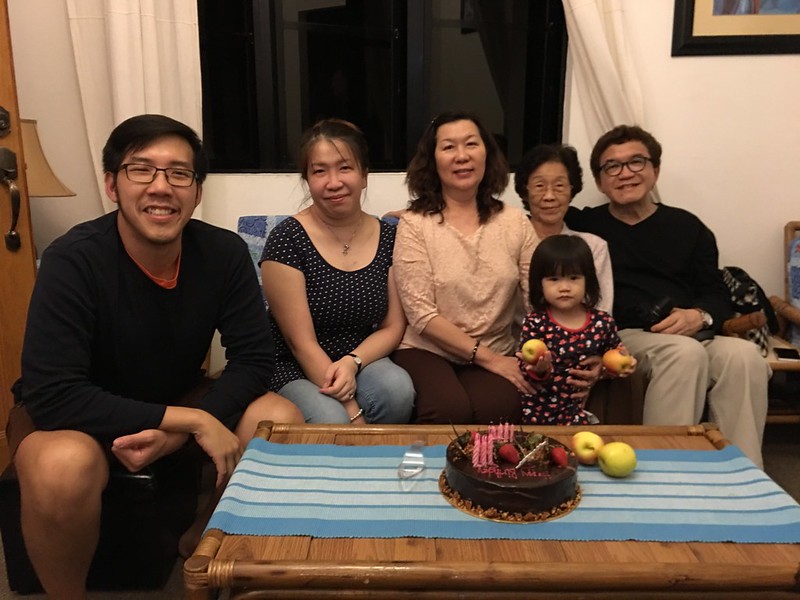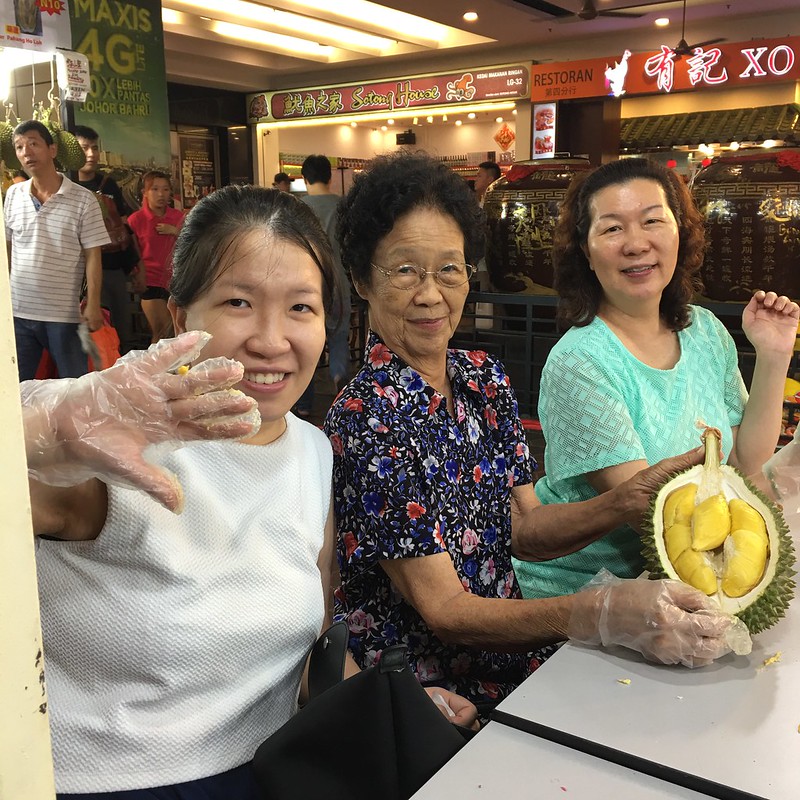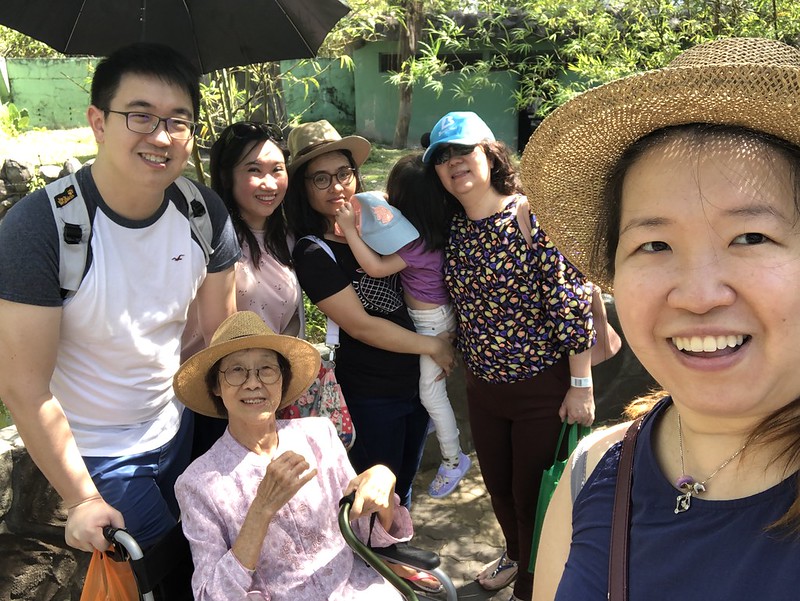Popo always said her father told her, “We have no village.”
She never knew where she came from from China but at least she knew her mother was from Sanshui in Guangdong. Sanshui women are famous for being hard working labourers who first settled in Singapore contributing to the construction industry there. Not knowing her roots, she had no cousins, aunties or uncles who bore the same surname as her.

My great grandparents arrived in Singapore after they got married in search of a better life as thousands of immigrants did back in the 1920s. They both worked hard to make a living and great grandmother Chow in particular took on small jobs as a seamstress to make ends meet. A friend told her that the Johor Bahru General Hospital (now known as Hospital Sultanah Aminah) was offering training programs for a midwifery course. Great grandmother Chow made her way across the causeway and learned the skills of the trade.
Unusual for a couple of that generation, they tried for a child for many years. My great grandmother was a grand old dame of thirty years old when she finally had my grandmother in 1931. As she was already working at the Johor Bahru General Hospital, Popo was born at that hospital. Who knew that some seventy years later, one of her granddaughters would have started her career at that very same hospital.
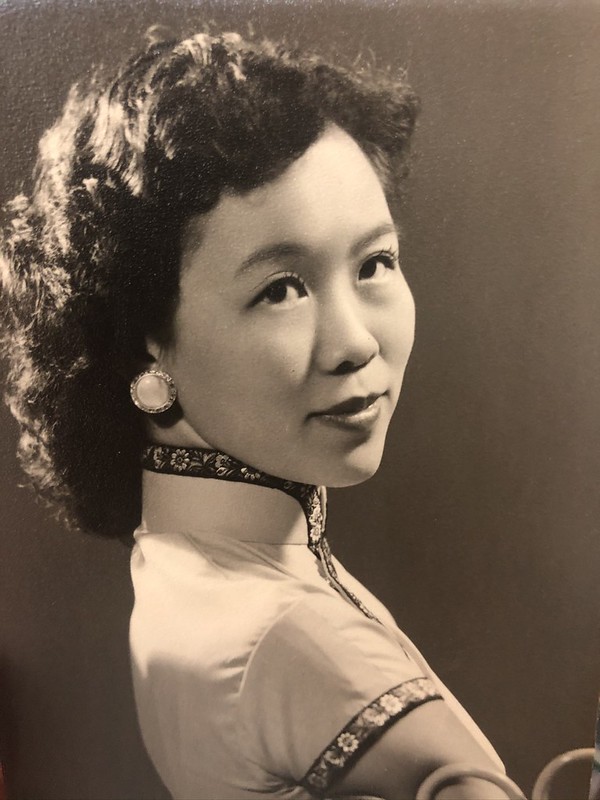
Not long after Popo’s birth, great grandmother Chow heard that there was a vacancy for a midwife position at a new general hospital up north – all the way in Malacca! Having never been there before, this brave woman packed up her infant daughter and made Malacca her new home. Great grandfather Chow continued working in Singapore and only managed to see his wife and daughter very very rarely.
Being the only child of a mother with a small but stable salary, Popo had a relatively comfortable childhood. They never went hungry and she even had a nanny. A hostel was provided with running water and electricity. Heck, she even had the chance to go to kindergarten! The kindergarten was next to Malacca Methodist Girls’ School which she subsequently enrolled at when it was time to go to primary school.
As Great Grandmother Chow was a midwife and had access to scores of abandoned babies, she brought a little girl home one day. The child passed away from an illness when she was only a toddler. Heartbroken, she brought home another baby. A baby boy this time. When he was about five years old, there was a measles outbreak and the little boy succumbed as well.
Popo could have been english educated if not for the Japanese Occupation that stopped life as they knew it for nearly four years from 1942 to 1945. Popo had just finished standard four when the war began. With no more job and no more school to go to, Popo and Great Grandmother Chow fled to Singapore to be with Great Grandfather Chow. They stayed with relatives in Singapore before finding work at an electrical components manufacturing factory which was taken over by the Japanese.
Popo, like many people her generation, harbours a deep hatred for the Japanese soldiers for the atrocities that were commited during the war. When I brought her to Japan in 2018, I asked her if she was still angry with the Japanese. She said she was still kinda angry but would also like to enjoy a nice holiday somewhere far away and eat good food and see new things. I still remember the fascination and delight on her face when we saw Mount Fuji from our cable car.
Despite all the scary things we have heard from our grandparents who survived the war, Popo was fortunate enough that her family and herself were never tortured by the Japanese soldiers in any way. She even has fond memories working in that Japanese electrical factory as she had other ten year old girls for company working all day long. She often told me about a kind Japanese general who was sort of the manager at the factory who was very nice to her. He always asked her to make him a cup of coffee every morning and would let her enjoy a cup of coffee too – that was how her great big love for coffee began. Tea time always made Popo’s eye lit up as she could never resist her daily cup of coffee.
Air raid warnings were so routine and normal for Popo and her family. A siren would wail in the sky and everyone would grab their belongings and run outside in case this was the night that their quarters would be destroyed by bombs. After many more air raid warnings, the factory workers and their families became nonchalant and did not bother taking their things with them everytime they ran out into the night.
Unfortunately, their luck ran out one night and their quarters went up in flames as bombs dropped all over. Popo and her parents only had the clothes on their back. Everything they had was destroyed in the fire.
Never one to give up, Greant Grandmother Chow went to work at a restaurant in an amusement park. Popo worked as a ball picker for a mini golf course at the same amusement park. She remembers being able to catch a 1940s Shanghai black and white movie at the theatre for free while waiting for her mum to finish work.
When the occupation ended, Popo and Great Grandmother Chow made their way back to Malacca to see if they could pick up where they left off. It took many years to rebuild schools and for the teachers to come back to their positions. By then, Popo was already 15 years old and she had to go back to school to study from scratch. She enrolled in standard three at a chinese school in Malacca as she got interested in the chinese language as her parents had sent her for lessons during their stay in Singapore.
At that school along Heeren Street, Popo met her future sister in laws – 14th aunty and 9th aunty. Although they were of different ages, they attended the same class together.
By the time Popo completed her studies, Great Grandmother Chow thought it was high time that she got married.
A few streets away from her school was a well to do family who had a very eligible son and they were on the lookout for a wife for him. They consulted a Mui Yan Por (a matchmaker) who thought Popo was the perfect daughter in law for them!
“The girl that I want to introduce you to is the girl who cycles past your shop every morning on her way to school!” said the Mui Yan Por to my Kong Kong.
After their first meeting, many nights to Gluttons Corner (which is now Malacca Raya) followed. They would sit by the sea side and chat the night away while chomping on salted peanuts. After many months of courtship, they got married in March 1950.
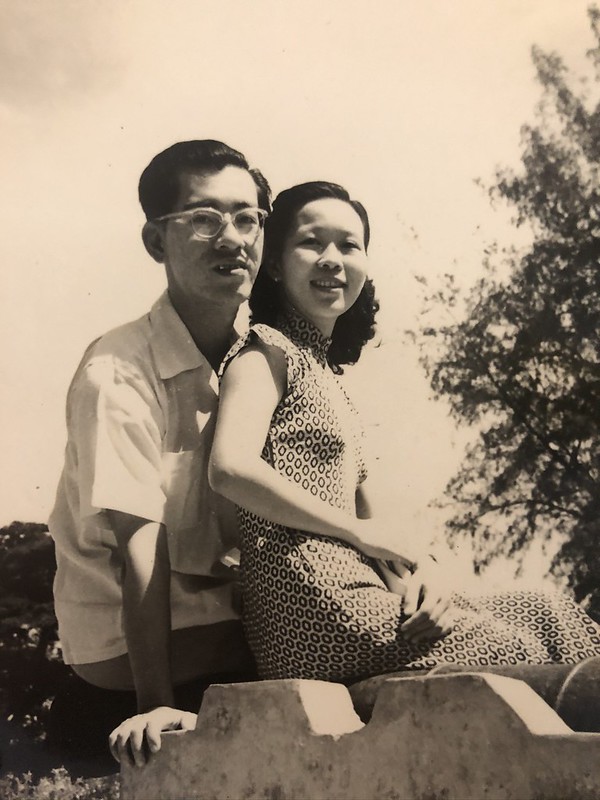
My Kong Kong’s family was one of the first in Malacca to own a car. So rare was it to have a car in those days that their number plate was M10, the 10th car in Malacca. The family owed their wealth to Great Grandfather Ho who came all the way to Malacca from Foshan in Guangzhou as a scrawny kitchen assistant at the tender age of 13. So tiny was he that he needed a stool to cook at the stove. As the years went by, he started selling pork porridge to the local coolies in a little bullock cart. He named his business Woh Chun – it means yummy taste. A strong entrepreneur, he later became a pork wholesaler and from his business he expanded to real estate and rubber plantations. Great Grandfather Ho had passed away just before the war began leaving behind six sons and three daughters with two wives – third great grandmother Ho and fifth greatgrandmother Ho.
After the war, Kong Kong and his older brother, Brother No 6, went down to Singapore to learn the ropes of managing a hardware store business from a relative. Kong kong went back to Malacca and started the business in 1948 with his brothers but was soon manning the fort alone when they left for their studies one by one. He named the business Woh Chun, wanting to carry on the name that his father used for his pork porridge stall. Popo always found it amusing why a name that meant something yummy could be used in the context of selling hardware.

He met Popo a year after he started his business. Planning a wedding and managing a business! It sounds very 2010s indeed – living the entrepreneur lifestyle and trying to have it all at the same time. I can definitely relate.

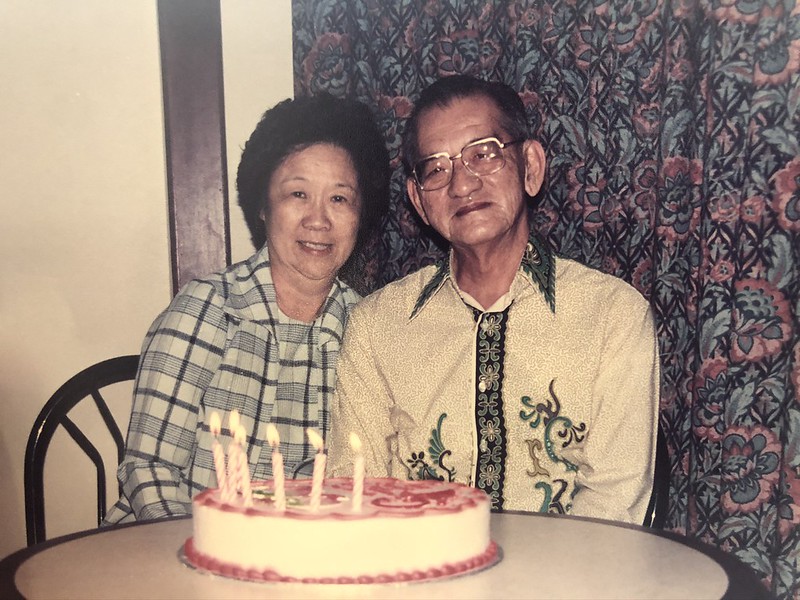
It was a huge culture shock for Popo when she married into the Ho family. She came from a family where it was just her and her mother with the occasional visit from her father to a huge family who lived together with servants, cooks and their very own trishaw pullers. All of them lived together above our hardware shop, Woh Chun. Instead of the carefree life she was used to, she had to live by the rules set by Third Great Grandmother Ho. She controlled the finances in the family and gave Popo an allowance for her to manage her own small household.

Her firstborn was my Uncle Yew Hee. Great Grand Mother Chow was understandably excited about being a grandmother and would frequently come over to Woh Chun to see her first grandson.
Not being one to mince her words, Third Great Grandmother Ho said to Great Grandmother Chow, “Since you like children so much, why don’t you adopt one yourself!”
Great Grandmother Chow was hurt by the comment and she took Third Great Grandmother Ho’s words very seriously. She adopted a little boy from the General Hospital and raised him as her own. His name was Yue Kam but back in those days, children were named after animals so that the spirits would not take them away. The family knows him fondly as Chu Chai which means Little Pig in cantonese.
Chu Chai was a year older than my fourth uncle, Uncle Yew Pun. He was more like a nephew to Popo than a brother. She brought him along for family trips during the weekends and I think if circumstances were otherwise, she would even have supported him for his tertiary education.
Falling with the wrong crowd when he was in high school, he grew to become one of Popo’s greatest burden. A burden so heavy that she often worried what would become of him when she passed away. He would have had a very fortunate life being adopted by Great Grandmother Chow and Popo’s love had he not strayed from the path. I first learned of his existence when I was a young child. Popo received a phone call regarding his rehab stint and one of the adults explained to me that there was a grand uncle who made many wrong decisions and that we should not learn from him. Despite his multiple relapses, he made attempts at holding down some jobs – a bus conductor, an ice cream man at the Stadhuys building to name a few. I never got to meet him. My brother did get to meet him though. Popo and my aunt, Aunty Sok Ping brought the two youngest grandsons to the Stadhuys building and enjoyed ice cream from Chu Chai’s mobile ice cream cart.
When he had a heart attack in 2012, I still did not get to meet him. I followed my mother and Popo to the Malacca General Hospital and hung around the corridor while they visited him in the ICU. He was found unconscious by a housemate and passed away a few days later. Popo felt sad for the life he had led but relieved that he was free of the demons that held him back from the potential he had.
Popo was blessed with five children with my mother being the youngest. To the world she may seem like a very fortunate and blessed woman but her heart had felt immeasurable pain, so painful that she could never find the right words to describe them to me.
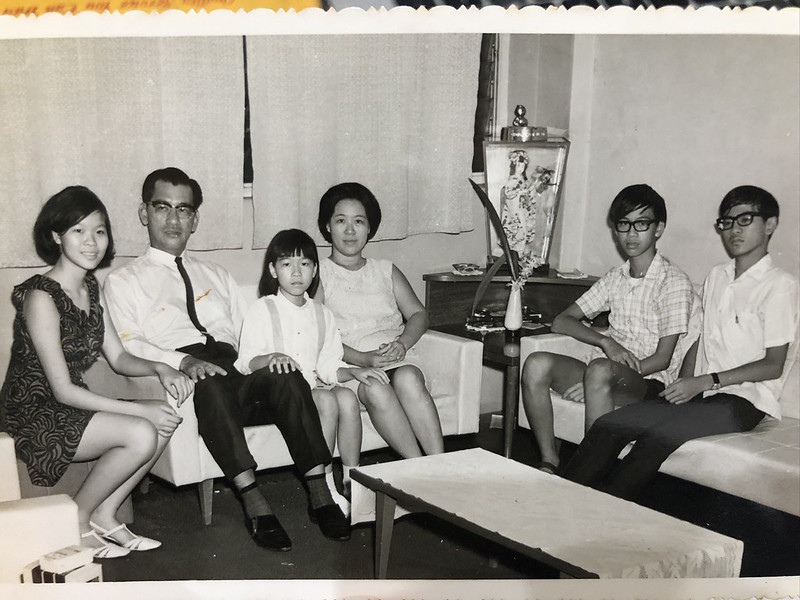
Her third son, my Uncle Yew Kuan, had gone away to study in Christchurch in 1973. He had completed his first year and did not come back for the Christmas holidays. On Boxing Day, he was found unconscious seeming to have passed away from a heart condition while jogging alongside a riverbank on campus. He was only nineteen years old.
Popo always said to me that she cried so much until her tearducts stopped producing anymore tears forever. She told me she vividly remembers seeing him wave to the family maid before leaving for the airport saying, “Ngan Cheh, I will be back! See you!” That was one of the last memories she had of him. He sent her letters during his first year at university and she has kept them safely in a box for almost five decades, crisp as the day she received them.
Some four decades after losing her third son, she loses her elder daughter, my Yeema Sok Ping.
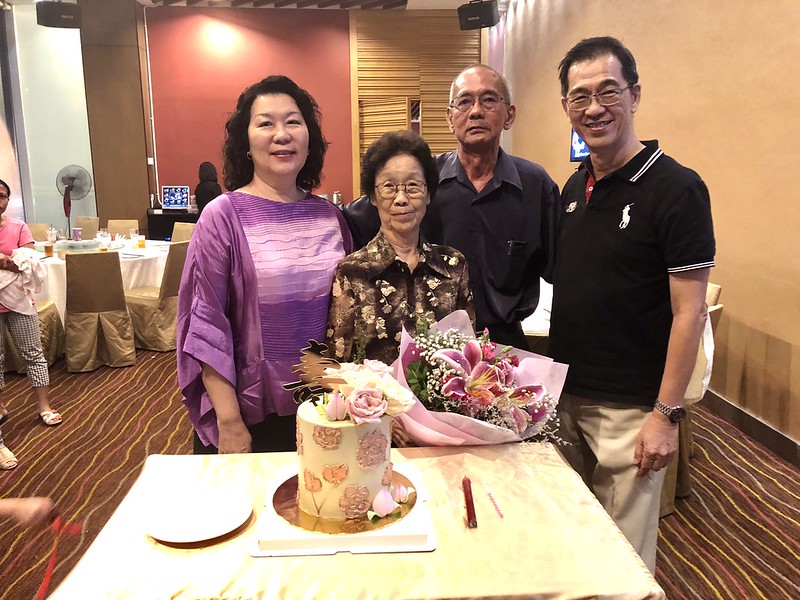
It was the school holidays in March 2008 when my Yeema decided to embark on another one of her DIY home improvement projects. Pigeons were coming to the first floor’s window sill to defecate and make noises everyday. A neighbour suggested to poison the birds but my Yeema decided that it would be best to hang CDs outside the window to scare the birds away instead. She placed a leaning ladder on top of a rickety school table to reach the window upstairs. The family maid was helping to hold the ladder while Yeema attempted to climb up.
Popo had told her “Don’t do this! It’s not safe!”.
Yeema reassured Popo that it will be fine. Popo had only gone out for 10 minutes with the family driver to throw some rubbish when she came back to the house, she saw the neighbours’ maids crowding around outside her gate. They saw my Yeema bleeding on the floor in what seemed like a fall and the driver scooped her into the car and rushed to the hospital. Popo said Yeema was lying on her laps while bleeding from her ears.
In the hospital, Popo had said to Yeema, “I am not even over your brother’s death and now this is happening to you.” Yeema passed away the same day without regaining consciousness. She was going to retire as a school teacher that very year.
Popo always said the pain of losing Yeema was only slightly lesser than the pain of knowing what Yeema had to go through in her marriage. She had separated from her husband in Ipoh and went back to Malacca after the divorce, after only four years of marriage. One of the stories that she shared with me was when my cousins Yen Yen and Yong Yong were 5 and 6 years old – they had walked out of their family home in Ipoh and wanted to find their way to Malacca to “find mama”. They were walking under the sun until a kind taxi uncle saw the two children walking along the road. He stopped to ask them where they were going and managed to bring them home to their father.
I am sure Yeema herself would never have dwelled on sadness in the same way because she was the most positive person that I will ever know. No one can match her enthusiasm for life but unfortunately life was too short for her. They say the good ones go first.

During the funeral, my cousin Yen Yen and I were saying, “Maybe now at the chinese new year reunion dinner in heaven, Popo is eating happily with Kong Kong, Uncle Yew Kuan and Yeema.”
I would like to think so too.



–
Popo’s kindness is legendary. So legendary that people whom she has helped never forgets her kindness for many many years.

When her children were growing up, she kept her doors opened to all their friends. Her children’s friends were welcomed to join the family for dinner and even their weekend swimming outings at Malacca Club. Old friends of my uncles still speak about this memory fondly.
One of the little boys that she had been kind to grew to become a very dear family friend, Uncle Nama. Uncle Nama is my Uncle Yew Hee’s best friend.
Popo often recalled many stories about the two of them. She told us about how my Uncle Yew Hee once took a tin of milk powder to school. Popo asked, “Where are you taking the milk powder to?”
“I’m bringing it for Nama. He doesn’t have enough nutrients,” Uncle Yew Hee had said. His best friend came from a poor family and he wanted to share the better things he had with his friend.
Touched by his kindness, Popo knew she had brought him up well and allowed him to bring the whole tin of milk to school.
Uncle Nama pretty much grew up with my Uncle Yew Hee and the rest of his four siblings. He was a permanent fixture with the family for their weekly swimming sessions.
When the entire country went into emergency in 1969, the first person that my Uncle Yew Hee worried about was Uncle Nama. He ran down to our family shop lot’s ground floor, intending to cycle over to check on his best friend…only to open the door to see that Uncle Nama had already arrived with his bicycle, worried about the exact same thing.
When Uncle Nama got a scholarship to go join the Singapore Navy, Uncle Yew Hee sent him a pair of shoes because he knew Uncle Nama needed new shoes. Uncle Nama kept the shoes for many many years. Even when it was tattered and old, he refused to throw it out. Aunty Prabha, Uncle Nama’s wife, threw it out one day and Uncle Nama was so upset. He treasured his best friend’s kindness for so long.
Uncle Nama and Aunty Prabha have always loved us like their own family. At Popo’s eulogy, Uncle Nama spoke about his memories of her. He said she was like a godmother to him.
Popo believed that parents should always open their homes to their children’s friends and in turn, we have been blessed by a deep and lasting friendship in the likes of Uncle Nama and Aunty Prabha.
My parents clearly learned this from my Popo. Friends who went to school with me knew that they could always drop by my place to hang out anytime. Because of this generosity and trust, I enjoyed a very happy high school life.
–
Popo’s kindness extended to the people she met outside of her family. One example that my mother recalls very well is this lady who sold Red Bean Soup (Tong Sui) that my Popo often patronized. She knew that the lady had five school going children and they weren’t doing well financially. Popo would always give this lady some money to buy books and uniform for her children before the school year started.

When a relative could not afford to pay for her son’s Form Six exam fees, Popo offered to pay for them. The boy passed his Form Six exams and went on to a teacher’s training college and went on to become a secondary school teacher at Malacca High School. That family remembers Popo’s kind deed until today.
Being the kind person that she was, she loved animals very much. She would take in stray cats to neuter them, nursed them back to health before letting them go.
She and my mum would feed the stray cats and dogs in the neighbourhood with our leftover food. She would always remember to put aside something from the dinner table for them.
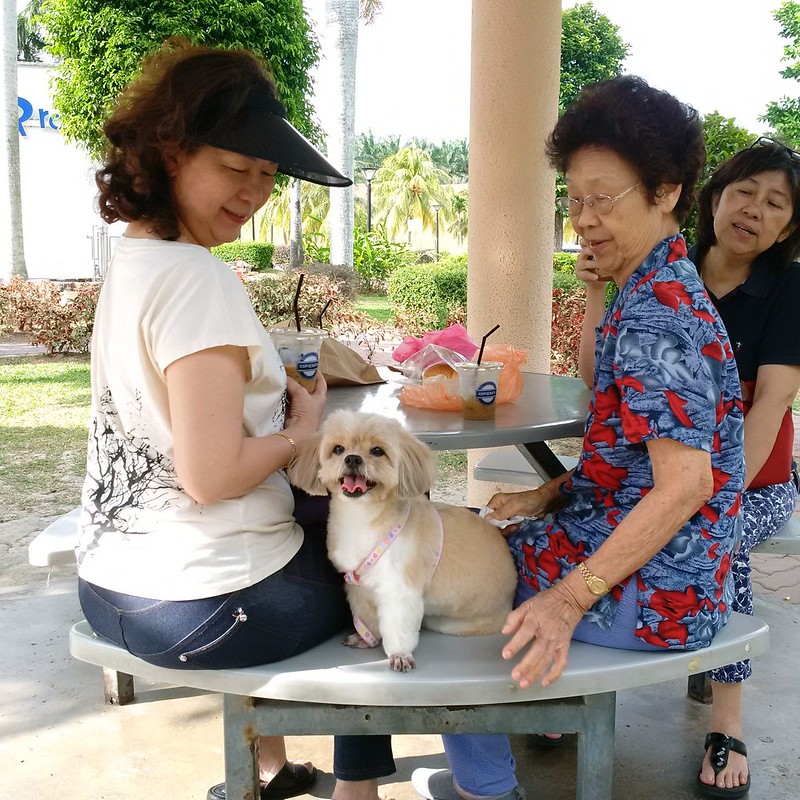

–
It kills me still that I wasn’t there for her very last day. Liselle had a fever the day before we were scheduled to go to Malacca to join the family. I am very sorry that I didn’t bring Liselle to see her one last time. Liselle has been the apple of my popo and parents’ eyes. Everyone knows that. She looks forward to watching Liselle’s videos on my mother’s facebook account – she will even inform my mum if a new video is up.
Liselle is blessed because of all popo’s eight grandchildren and seven great grandchildren, she is the only one who is fortunate enough to spend her early years in popo’s constant companion. The rest of us have other doting grandmothers who cared for us in our infant years. I probably rely more on my mother than my mother ever had to rely on her mother. In that way, we constantly see each other despite the 300km apart.


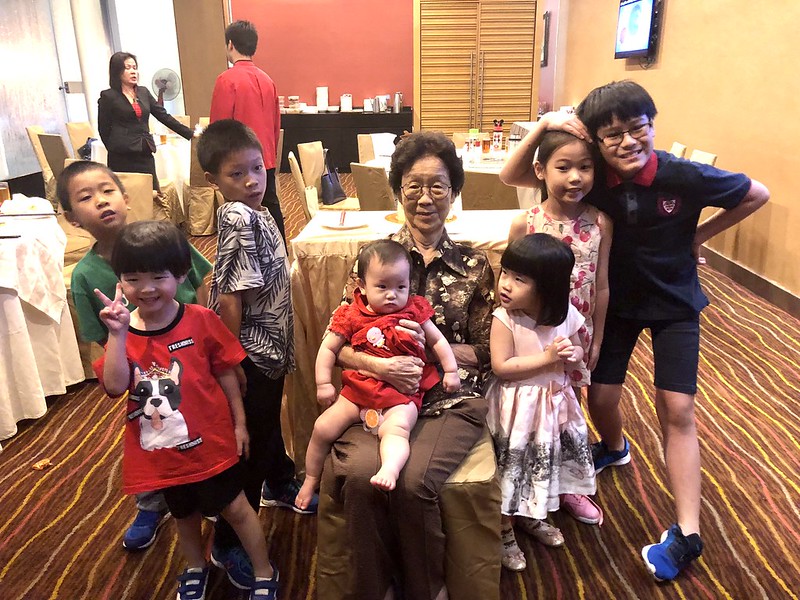
Even though Popo wasn’t our primary caregiver grandmother, she was lucky enough to spend time with her grandchildren and have a few favourite stories to share about them.

One of the stories that always tickled her was when she bathed a 3 year old cousin Hong Fei. She put shampoo on his head and washed it off and continued to bathe him. Puzzled, he asked, “Why no conditioner? I tell my mummy you never use conditioner.” Even though he is now 42 years old, she remembers this story very well.

Quite the maestro at the stock market, Popo frequently brought her grandchildren with her when she went to check on her stocks. She nearly fainted when a young cousin Jacqueline started to rub away the price of sugar stocks on the blackboard. Keep in mind that this was in the late 80s or very early 90s.
Another boo boo at the stock market was when she brought a 3 year old Yong Yong along and he blew his toy whistle loudly, causing the people at the stock market to think that it was a fire alarm. Poor Popo.


I think all Popos grandchildren are cutest at the age of 3. My Kong Kong had a stash of naughty magazines that had a hiding place that was very well known among the eight of us grandchildren.
The four older grandchildren had their fair share of looking through his mags and by the time the younger four of us were a little older, we too found the same hiding spot – a little drawer at the headboard of my grandparents’ bed.
The four of us – me, Mervyn, Jacqueline and Derek were sitting on their bed, flipping through the magazines when an alarmed Popo exclaimed “Lei dei tai mat yeh??” (What are you all looking at?)
3 year old Mervyn looked up and exclaimed, “Tai tet tet!” (See boobies!)
Popo was so tickled that she would recall this story for years and years.




–
The most significant story from my childhood with Popo is about that one time that I went missing at Subang Parade.
I was 3 years old at that time. Popo and Yeema had come up to Subang from Malacca to spend some time with us. I skipped kindergarten that day to follow my mum, grandma and aunt to Subang Parade!
My mum brought me to the toilet to wash my hands before we sat down to enjoy some ice cream at Baskin Robbins. As my mum was washing her hands, I dashed out the toilet hoping to go back to my grandma and aunt. My mum dried her hands and when she came out, she could no longer find me.
I remember running along the side where Pizza Hut was not knowing how I could cross over the marble benches that stretched the entire length of the center of the mall over to the side where Baskin Robbins was. Baskin Robbins was next to McDonalds at that time.
I remember being surrounded by a bunch of women and I reached out my hands to them but nobody would carry me.
The next thing I remember was someone carrying me and asking me in cantonese, “Where’s your mummy?”
I really wanted to reply in cantonese but my 3 year old brain could not make out the words so I said, “Toilet.” and pointed towards the direction of the toilet (where Toys R Us was back in 1990. I hear that in 2021 Jaya Grocer will be taking that space?).
The lady brought me towards the opposite direction instead, where Parkson was/is.
Back at Baskin Robbins Popo felt an uneasiness within her. She asked my aunt many times where I was. My aunt repeated many times that I was with my mum at the toilet. Popo still felt something was wrong.
Suddenly, she heard a child’s footsteps running past, slippers slapping the floor. It felt so familiar to her so she called “JOLENE!” and I turned around immediately.
Popo dashed over to the lady and grabbed me back while thanking the lady profusely. The lady stared blankly at my Popo, didn’t say a word and quickly hurried away. It was at this point that Popo realised that this was a kidnapping attempt.
By the time my mum saw me, I was quietly eating my ice cream at Baskin Robin. Mum was almost losing her mind already because she thought she had lost me.
We often talk about this incident over the years. Each time, Popo would tell me the story with a deep sense of panic and gratefulness that I am still here today. Popo is truly the person who saved my life. God knows what would have happened to me if she didn’t call my name that day?

–
I have no regrets with Popo. I had as much time as I could possibly want with her and I had an amazing relationship with her that there’s nothing but happy moments to look back on. There is so much to miss about her – her wise words, her empathy, her insight.
Popo came to live with us in 2008 when my Yeema passed away. We were blessed to spend twelve happy years with her. She was our nucleus. The person I worried about the most after her passing was my mother. For 12 years she was my mother’s daily companion, keeping her company when my father was working. I worried about the empty days ahead when my mother would miss Popo too much.

My mother frequently wondered about how there would come a day when Popo is no longer by her side. She remembers listening to Popo’s old chinese songs in her car while driving with Popo and thinking, “There will be one day when I can no longer listen to these songs together with her again.”
I am thankful my two girls have provided my mother with the distraction she needed so much. She was kept so busy that she barely had time to pick up the pieces from when my grandmother passed away a year ago. Her room is still untouched, clothes still hanging neatly in her wardrobe, her books still stacked by her bedside table. My mother doesn’t know when to start or how to start or if she even wants to start clearing Popo’s things away.
Her death may have been a shock to all who loved her but it is her greatest blessing that she went away suddenly and easily. There are days that I just stare at Lynette asking her if she is actually Popo reborn again. Maybe it is silly but sometimes we grief in strange and comfortable ways.
I try to keep memories of her alive in the small things I do daily.
When I brush Liselle’s teeth, I hum Popo’s favourite english song, Red River Valley.
From this valley they say you are leaving
We shall miss your bright eyes and sweet smile
For you take with you all of the sunshine
That has brightened our pathway a while.
Then come sit by my side if you love me
Do not hasten to bid me adieu
Just remember the Red River valley
And the cowboy that’s loved you so true
For a long time, my darlin’, I’ve waited
For the sweet words you never would say
Now at last all my fond hopes have vanished
For they say that you’re going away
Then come sit by my side if you love me
Do not hasten to bid me adieu
Just remember the Red River valley
And the cowboy that’s loved you so true
How fitting are the words of her favourite song in my farewell letter to her.









